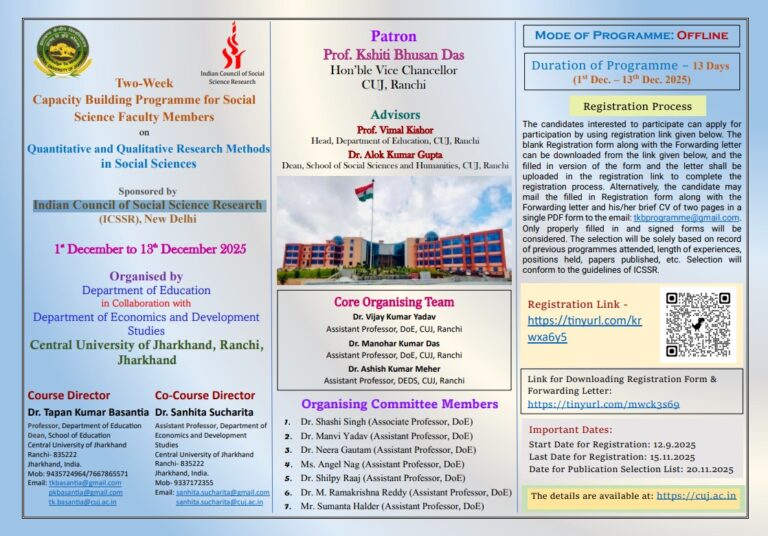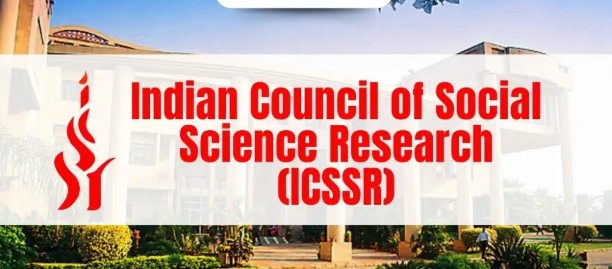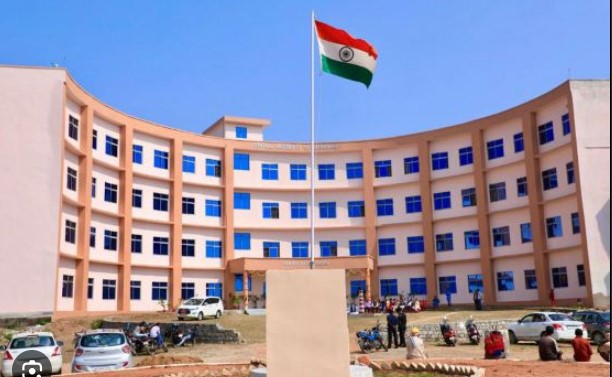
Two-Week Capacity Building Programme for Social Science Faculty Members on Quantitative and Qualitative Research Methods in Social Sciences
In the dynamic field of higher education, research has emerged as the backbone of academic excellence and knowledge creation. To strengthen the research capacity of educators and enhance the quality of academic output, the Department of Education, in collaboration with the Department of Economics and Development Studies, Central University of Jharkhand, Ranchi, Jharkhand, is organizing a Two-Week Capacity Building Programme for Social Science Faculty Members on Quantitative and Qualitative Research Methods in Social Sciences. This prestigious programme will be held from 1st December to 13th December 2025 and is sponsored by the Indian Council of Social Science Research (ICSSR), New Delhi. It aims to empower social science faculty members with advanced research knowledge, methodological skills, and the confidence to contribute meaningfully to the evolving academic landscape.
The programme has been conceptualized to address the growing need for methodological expertise in both quantitative and qualitative research approaches. Social science research plays a vital role in understanding and analyzing complex societal issues such as inequality, governance, economic growth, cultural transformation, and human behavior. In this context, quantitative research methods provide measurable, data-driven insights, while qualitative research explores the lived experiences, social dynamics, and cultural contexts of individuals and communities. By combining these approaches, the programme seeks to provide faculty members with a holistic understanding of how to conduct rigorous and impactful research.
The two-week capacity building initiative will focus on multiple objectives. It will train faculty members in designing effective research proposals, conducting surveys and field studies, applying statistical techniques, and analyzing data using software like SPSS, STATA, and NVivo. At the same time, it will introduce participants to qualitative methods such as ethnography, case studies, grounded theory, and narrative analysis. Sessions will also cover research ethics, academic writing, and strategies for publishing in reputed journals. These objectives are aligned with the vision of ICSSR to strengthen India’s academic research ecosystem and nurture educators who can guide students in producing high-quality scholarly work.
A distinctive feature of the programme is its multidisciplinary orientation, welcoming faculty from various disciplines such as Sociology, Political Science, Economics, Education, History, Psychology, and Public Administration. This diverse participation fosters an environment of cross-disciplinary dialogue, encouraging participants to exchange perspectives, learn from each other’s experiences, and collaborate on future research projects. Such collaborative learning is particularly crucial in the social sciences, where problems are often complex and require insights from multiple fields of study.
The programme structure is thoughtfully designed to balance theory and practice. Faculty members will benefit from lectures by renowned experts, hands-on workshops, and interactive sessions. Group discussions and project assignments will allow participants to apply the concepts learned during the training. Practical exposure to research tools and software ensures that participants not only understand the theoretical frameworks but also gain confidence in applying them to real-world academic research.
Click here to download the full notification in PDF

Equally important is the programme’s emphasis on research ethics and integrity. In today’s academic climate, issues such as plagiarism, data manipulation, and ethical concerns in human subject research have become increasingly significant. Special sessions are dedicated to sensitizing faculty members to the importance of honesty, transparency, and accountability in research practices. By fostering a culture of ethical scholarship, the programme prepares participants to contribute responsibly to academia and society.
Another major outcome expected from this programme is capacity building for institutional development. Faculty members trained under this initiative will not only improve their individual research capabilities but also enhance the academic environment of their respective institutions. They will be better prepared to mentor students, guide dissertations and theses, and initiate innovative research projects. This ripple effect ensures that the benefits of the programme extend far beyond its duration, strengthening the overall quality of higher education and research in India.
The programme also offers an invaluable platform for networking and collaboration. Participants will interact with peers from different regions and institutions, as well as with eminent resource persons and researchers. These interactions often lead to long-term collaborations, joint publications, and interdisciplinary research projects. Building such academic networks is crucial in today’s globalized research environment, where collaboration enhances both the quality and impact of research.
The sponsorship by ICSSR, New Delhi, is a testament to the programme’s academic significance. As a premier body promoting social science research in India, ICSSR plays a crucial role in supporting such initiatives. Its involvement ensures that the programme is not only well-resourced but also aligned with national academic and research priorities. Through this collaboration, ICSSR continues its mission of fostering high-quality social science research that contributes to policy-making and social development.
From a broader perspective, the programme seeks to address the gap between research and policy-making. Social science research is not merely academic; it has real-world implications for governance, economic planning, education reforms, and social justice. By equipping faculty members with advanced research skills, the programme ensures that their work is relevant, impactful, and capable of informing decision-making processes at local, regional, and national levels.
In conclusion, the Two-Week Capacity Building Programme for Social Science Faculty Members on Quantitative and Qualitative Research Methods in Social Sciences, organized by the Central University of Jharkhand and sponsored by ICSSR, New Delhi, from 1st to 13th December 2025, is a landmark initiative. It is designed to enrich the academic, professional, and ethical competencies of faculty members, enabling them to conduct high-quality research, mentor students effectively, and contribute to institutional and national development. By bridging the gap between theory and practice, ethics and innovation, and academia and policy, this programme stands as a milestone in advancing social science research and education in India.
Click here to download the full notification in PDF
Disclaimer
The information provided regarding the Two-Week Capacity Building Programme for Social Science Faculty Members is intended solely for general informational and academic purposes. While every effort has been made to ensure accuracy, the organizers reserve the right to make changes to the schedule, content, resource persons, or other details of the programme without prior notice. Participation in the programme does not guarantee any certification, employment opportunity, or professional advancement beyond what is officially communicated. The organizers shall not be held responsible for any direct or indirect loss, inconvenience, or liability arising from reliance on the information shared. Faculty members are advised to verify details with the official authorities before making commitments related to the programme.

For more information and updates please follow the page and don’t forget to leave your comment.
